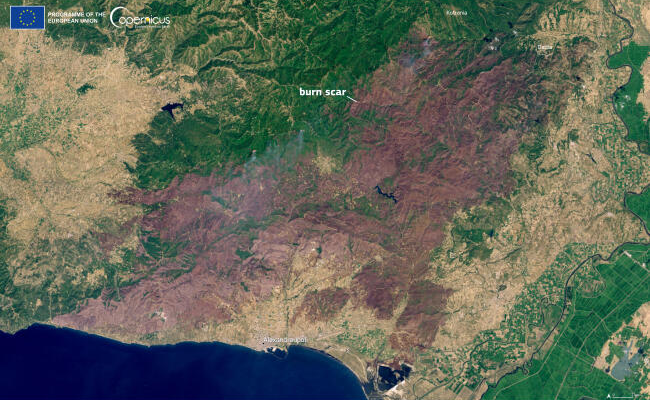In Greece, flames have been raging in the north of the country for just over two weeks, near the land border with Turkey. In this forest area, some 90,000 hectares of vegetation have already gone up in smoke in what now represents “the biggest fire ever recorded” in Europe. The size of the fire has significantly reduced compared to previous days, but it is still not extinguished.
3 mins
From our special correspondent in Alexandroupoli,
In the Evros region, even if the size of the fire has clearly reduced, the consequences of this extraordinary fire are considerable. On a map of Copernicus [le système européen de surveillance des feux de forêt, NDLR] in northern Greece, from the large city of Alexandroupoli to the neighboring forest of Dadia, there is a burnt area that extends over almost the entire territory of this border region, like a kind of very large gash .
On the ground, rolling along that same scorched area, nature offers miles of desolate landscapes, dull, as if razed and discolored by fire. In particular, we can see rows of bare trees on a blackened, sometimes grayish earth. A view that contrasts with the intense green color that still covers the trees, which have been spared by the flames. And on the spot, even at a distance from the fires, and even if you end up getting used to it, there is also almost everywhere a lingering smell of burning in the air.
Waiting for the rain to put an end to the fire
The latest statements from Greek firefighters now seem to be going in the direction of a lull. The presence, Sunday, September 3 in the evening, of a large handful of canadair planes on the tarmac of Alexandroupoli airport – the major city closest to the disaster – attests that the fight against the fire is still continuing in the region. But the area of the main front has decreased and the flames are now concentrated in the Dadia forest, not far from the border village of Soufli.
The hope on the spot, now, is on the rain, which could accelerate the end of this extraordinary fire. That’s just what the weather forecast says: it could rain this Monday or Tuesday, which should probably put an end to what is being called the biggest fire ever ” checked in in the European Union, that is to say the biggest fire for more than twenty years.
A summer marked by evacuations
Fires are a seasonal phenomenon in Greece, but the country has been hit particularly hard this summer with 26 dead – including a group of migrants trapped in flames and two Canadair pilots injured – and with at least 150,000 hectares of burnt across the country, Greece indeed was not spared.
The summer here was also marked by the proliferation of evacuation instructions, such as in Rhodes in July, when more than 20,000 people – including many tourists – had to flee in an emergency in the face of the fires. This policy of preventive evacuations results from another fire, in 2018, in the village of Mati. This fire had at the time caused a hundred deaths in a few hours and it represents a national trauma in Greece.
Faced with the fires, migrants are seen as scapegoats
In his office, whose windows overlook the port of Alexandroupoli, Dimitrios Petrovits deputy governor of the Greek region of Evros recalls, with the support of a map, that the forest area affected by the flames for more than fifteen days is located on a route taken by migrants and asylum seekers to reach Europe. What to explain that the firefighters found, at the end of August, the charred bodies of a group of 18 people, in the forest of Dadia.
” This fire was particularly devastating because the wind quickly helped push it out of control. The wind blew so hard that it regularly created or rekindled several different fires. This fire could be compared to the Hydra of Lerna in the Labors of Hercules. When you attack it on one front, two or three other fronts appear simultaneously, it’s something unprecedented and quite catastrophic. “, details Dimitrios Petrovits.
Faced with the extent of the damage, many voices are heard in the region to suggest the involvement of migrants in certain fire starts. A point of view devoid of evidence, also relayed by the Greek Prime Minister himself.
In northern Greece, in addition to destroying the forest, the flames have also stirred up anti-migrant sentiment.
Read alsoGreece fire: Northerners angry at ‘disastrous’ damage
